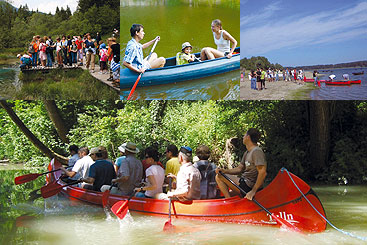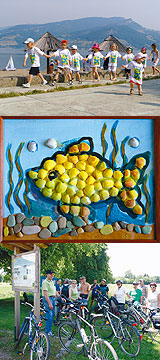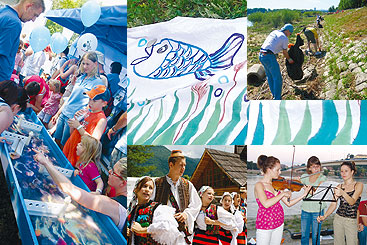
Danube Day 2008
celebrates the
Danube rivers:
“Let’s use them
not abuse them”
Over 81 million people in 14 countries came together to honour one of Europe’s greatest river systems and the people and wildlife that rely on it.

Celebrating this day together helps protect the Danube rivers so they can be used and enjoyed by generations to come.
Danube Day is a celebration of a cleaner, safer river following 1 years of international cooperation. Huge festivals on the banks of the rivers; public meetings and fun, educational events pay tribute to the Danube, its peoples and the progress that has been made. Danube Day strengthens our “Danube solidarity“, highlighting that, in spite of our different cultures and histories, we have a shared desire and responsibility to protect our precious resource.
Ambitious activities in all 14 major Danube countries were bursting with inspiration to unite the countries in celebration. Many events focused on young people, empowering them to shape a positive future for the Danube. In Romania, a special class was held where children played teachers and politicians and other officials were the students. The ‘teachers’ prepared a quiz on water issues and aspects related to the Danube River.
Danube Day also served as the occasion to launch the Romanian version of the Danube Box, called ‘The Blue Danube Book’. Lucia Ana Varga, State Secretary in the Ministry of Environment and Sustainable Development of Romania, was joined by other high ranking government officials, representatives of local NGOs as well as representatives from supporter Coca-Cola HBC for the launch. “The Blue Danube Book has an important role for the education of the children regarding the Danube Basin values and traditions,” said Varga, “as well as for raising their awareness regarding the protection and the conservation of the aquatic ecosystem.”
Children also led celebrations in Germany. Students from the Wolterdingen Primary School performed their play, ‘The New Source of the Danube’ and students from the Eichendorf School in Donaueschingen, Germany, presented their art project, ‘The Danube Puzzle’, with a secret poem hidden in the puzzle.
“The Danube feeds us, treats us and gives us water,” said Tatyana Semenovna Repkina, head of the Izmail Department of Culture, “We must be grateful for all of the Danube gifts.”

Celebrating culture and traditions. There was a rich cultural programme in Vukovar, Croatia, with a focus on traditional songs and dances and programmes for visitors to learn about old customs and traditions of the people living along the Danube. In addition, all visitors were treated to a traditional fish stew on the banks of the river. Fish played a key role at events in Austria as well. A lunchtime fish buffet offered visitors the chance to sample tasty dishes, while learning about the health benefits of fish in Tulln, Austria. In other cities around Austria, fish bookmarks – highlighting fish from the Danube River – were distributed to more than two thousand people.
Taking the festivities onto the water. The sound of ship horns reverberated across the Danube Basin at 14:00 on Danube Day, as Danube workers paid a special tribute to their river – a river that provides them with food, water, power, recreation and, crucially, their livelihoods. As part of the annual Greet the Danube horn blast, organised by the Global Water Partnership (GWP), ships along the Danube from Germany to Ukraine simultaneously sounded their horns in a united salute to the rivers.
“The Danube
should no longer
be just an alternative,”
said Maria
Dimova, Regional
governor of Ruse,
“The Danube has
to become a priority
for all of us.”
Vojvodina Waters of Serbia held an ‘Introduce yourself to the Danube’ cruise, inviting visitors on a free tour to find out more about the river they live with. “Danube Day is one of the symbols that point out our need to live together with our rivers instead of living along our rivers,” said Aleksandar Prodanović, Director of the Water Directorate of the Ministry of Agriculture, Forestry and Water Management.
In the Czech Republic, sailing enthusiasts took to the waters for a sailing tour of the Morava River through the Litovelske Pomoravi Protected Landscape Area. Organisers in Slovenia started an international event on the Mura River. The twoday event took passengers from four countries on a river cruise from Austria to Croatia, stressing traditional wooden boats as treasures from the past.
“The Danube cooperation is an example to be followed,” said eduardo Jara of the water Tribune of the zaragoza expo.

Sharing ideas for a shared river. Ruse, Bulgaria, hosted an international symposium called ‘Potential to alternative tourism development – Danube regions – competitive advantage’. The forum presented ideas and good practices on Bulgarian and European tourism, but also highlighted a range of funding opportunities for public and private projects in tourism. “The Danube should no longer be just an alternative,” said Maria Dimova, Regional Governor of Ruse, “The Danube has to become a priority for all of us.”
An exhibition called ‘Green innovations for the sustainable development of the Lower Danube – Prydunav’e region’ was held in the Culture House in Izmail, Ukraine. Ten organisations and private companies presented their projects on organic agriculture, small scale alternative energy supply, ecological sanitation and wastewater treatment as well as other water supply issues. The exhibition ran for two days and drew more than 700 visitors. “The Danube feeds us, treats us and gives us water,” said Tatyana Semenovna Repkina, Head of the Izmail Department of Culture, “We must be grateful for all of the Danube gifts.”
The Tisza Stakeholder Forum was held as part of Danube Day celebrations in Szolnok, Hungary. Representatives from government, NGOs, water users and academics met to discuss the status of River Basin Management in Hungary, as well as the ICPDR Tisza Group’s report ‘Analysis of the Tisza River Basin 2007’, recently translated into Hungarian. László Kóthay, State Secretary of the Ministry of Environment and Water of Hungary, spoke at the forum, stressing the need to “make a river basin management plan responding to the needs of the Tisza Valley and… the Danube Basin level as well”.
“A sustainable method of handling the Danube and its resources has to be secured. ... Sustainability means for us: thinking beyond the here and now, showing responsibility today for the future,“ said Julian Würtenberger, President oft the Freiburg District.
Spreading the word far and wide. The Danube took to the air in Sarajevo, Bosnia and Herzegovina with the radio show ‘For every drop of clean water – June is the month of the Sava and Danube Rivers’. Officials from water management discussed with participants about international convention and obligations in the water sector.
Celebrations went global this year as the Danube was represented at the 2008 World Water Expo in Zaragoza, Spain. Water and sustainable development was the theme for the Expo, which attracted more than a million people. At the initiative of GWP Hungary, with the support of the ICPDR and GWP CEE, Danube Day celebrations were held in Zaragoza, expected at Expo, with representatives from Austria, Bulgaria, Croatia, Germany, Hungary, Slovakia and Romania.
Visitors received a ‘Danube Passport’ to collect stamps from each of the seven Danube countries and to earn prizes. The Danube Box was also presented at the Austrian, German, Slovak, Romanian and Hungarian pavilions. “The Danube cooperation is an example to be followed,” said Eduardo Jara of the Water Tribune of the Zaragoza Expo.
This represents only a snapshot of the different events; full information can be obtained from: www.danubeday.org
Disclaimer
The information contained in the ICPDR website is intended to enhance public access to information about the ICPDR and the Danube River. The information is correct to the best of the knowledge of the ICPDR Secretariat. If errors are brought to our attention we will try to correct them.
The ICPDR, expert group members, nor other parties involved in preparation of information contained on this website cannot, however, be held responsible for the correctness and validity of the data and information provided, nor accept responsibility or liability for damages or losses arising directly or indirectly from the use of the information conveyed therein.
Only those documents clearly marked ICPDR documents reflect the position of the ICPDR.
Any links to other websites are provided for your convenience only. The ICPDR does not accept any responsibility for the accuracy, availability, or appropriateness to the user's purposes, of any information or services on any other website.
When using the information and material provided on this website, credit should be given to the ICPDR.
